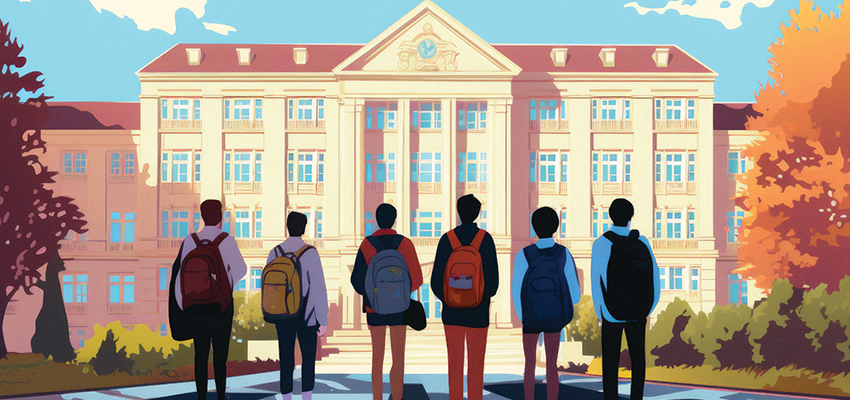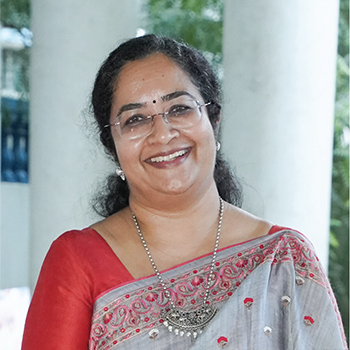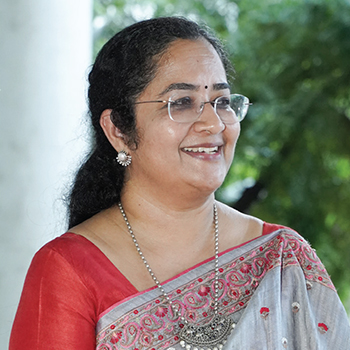Be Open to Change

Prof. Dr. Indu Nair, the Group Director, SCMS Group of Institutions, Kochi, holds a Master’s degree in Computer Applications and a Ph.D. in Human-Computer Interaction. With over 30 years of experience in research, academic administration, teaching, and software engineering, she has made significant contributions to the field. Indu is an active member of several professional associations, including the Computer Society of India, CII, KMA, CIO Network, and the Institute of Directors (IoD). Additionally, she serves as an Executive Board Member of the Association of Indian Management Schools (AIMS) and is a Charter Member of The IndUS Entrepreneurs (TiE) Kerala. In a tete-a-tete with Corporate Citizen, she gives an insight into academia and industry
Corporate Citizen (CC): In these 29 years of your professional service, what have been your observations about students?
Prof Indu Nair: In the late 90s, there was a significant surge in demand for engineering courses, with the general belief that the brightest minds would pursue STEM (Science, Technology, Engineering, and Mathematics) programmes. In contrast, the humanities were often seen as a less prestigious option. When we launched our engineering programme in 2001, electronics and mechanical engineering were the most popular branches—boys typically chose mechanical, while girls gravitated towards electronics. At that time, computer science was actually one of the hardest programmes to promote.
However, by 2008 or 2009, there was a dramatic shift. Computer science gained popularity as more job opportunities emerged in the field. Around the same time, the humanities also experienced a resurgence in interest. Today, we offer a variety of undergraduate programmes such as B.Com, B.B.A., and B.C.A., as well as psychology, which has seen a noticeable spike in enrolment, particularly around the Covid period. There’s been a large influx of students wanting to study psychology, both pre and post-pandemic. On the other hand, pure sciences have struggled to attract students—our botany and biotechnology programmes, for example, have relatively few takers.
CC: Are students aspiring to study abroad?
There is a growing trend of students migrating to other countries, especially among young people from our region in Kerala. Many are opting to pursue higher education in places like Canada, Australia, New Zealand, and Europe, including for MBA programmes. In my view, this is a concerning trend because we are losing some of our brightest students to opportunities abroad.
CC: This is so surprising that Kerala has no private universities. Please elaborate.
The government currently does not issue No Objection Certificates (NOCs) for private universities. Recently, there has been some indication that they may consider private universities as a potential option in the future, but deemed universities remain off the table for now.
"As a teacher, it’s my responsibility to adapt and reinvent my teaching methods to engage students and help them focus, especially since they aren't reading as much as they used to"
— Prof. Dr. Indu Nair
CC: What is the difference between private and deemed?

A private university is restricted to operating within the city or state where it is established. For example, if a university is set up in Cochin, it can only operate within Kerala and cannot expand beyond the state. This limitation is often seen as a drawback, making the deemed university status a better option, as it allows institutions to operate across India.
The government’s concern is that private universities may misuse their autonomy by increasing fees and compromising on quality. However, we all recognise that quality comes at a cost—you can’t expect both low fees and high standards simultaneously. In today’s informed world, students and parents are well aware and wouldn’t choose an institution solely based on affiliation or government backing. To sustain success, quality is essential. Our institution has thrived because we have upheld this principle, a mantra passed down by our founder chairman.
CC: Kerala has the highest literacy rate. So, how do you explain this contradiction, which is so diappointing.
In the late 90s and early 2000s, our PGDM programme attracted students from across India, largely due to Kerala’s reputation as a highly literate state. However, over time, the number of out-of state students has declined, primarily because of the growth of private universities in other regions. This shift has impacted the diversity that once enriched our programmes.
Diversity is essential—India’s strength lies in its vast cultural variety, where every 50 kilometres, you encounter a new language, tradition, and way of life. Unfortunately, we’re losing that diversity, which brings immense value to education.
CC: What are the correctives you suggest?
I believe the government should take our situation into account. We are a high-quality institution with numerous national and international accreditations, and we deserve recognition for maintaining our standards and thriving for 50 years without any government support. Our operations are sustained entirely by tuition fees from students. To attract top-tier students, we must offer exceptional quality, and there’s no room for compromise in that regard. The government should acknowledge our efforts and grant us the autonomy to run our own programmes.
CC: Over the last three decades, what have you seen in the changing patterns of students and their mindsets?
I often hear people criticising the next generation, but I don’t share that view. Every generation has its strengths and weaknesses. However, one noticeable shift today is the impact of social media, which has shortened many children’s attention spans and led to a more casual attitude—something that was rarely seen, especially at the postgraduate level. This is a significant change. In the past, students had fewer sources of information and relied heavily on their teachers. Now, with access to resources like MIT professors on YouTube, they have endless information at their fingertips. But, I don’t believe any generation is inherently bad. As a teacher, it’s my responsibility to adapt and reinvent my teaching methods to engage students and help them focus, especially since they aren’t reading as much as they used to.
CC: The earlier generation did not have so many sources of information. So, does that become a challenge for the professors and teachers?
Absolutely. In the past, both teachers and students relied solely on books for learning. But today, with the rise of AI and tools like ChatGPT, all that’s needed is a well-structured problem statement, and you can get instant solutions, if you know how to manage the chatbot. However, the challenge lies in ensuring quality—instant answers can lead to compromised understanding unless they’re properly applied. We can’t ignore these advancements; they’re here to stay. The key is to adapt and learn to work with them. Both students and teachers must rethink assessments and teaching methods, and if we do that, I believe we can thrive in this new landscape.
CC: How do you see the academic and industry interaction and placement situation?
The academic-industry interaction is progressing well, as the industry is increasingly interested in collaborating with institutions. At our institution, located in Kochi where industrial activity is limited, we still manage to engage with the local industry. On average, at least one corporate visit takes place each week, giving our students valuable opportunities to interact with professionals.
When it comes to placements, it remains a challenge across India, but we performed well last year. While companies weren’t hiring in large numbers, they were still recruiting, and we succeeded in placing our students effectively. Notably, our engineering school secured some core placements with competitive salaries, which was significant, as most graduates typically head into IT.
There’s often talk about the widening gap between academia and industry. I believe we need to take proactive steps to address this. Teachers must rethink their approach and tailor their input to better bridge this gap.
CC: Do you think the expectations of students are too much, compared to last year or last decade?
Yes, comparisons are inevitable. Students often evaluate institutions based on the salary packages they expect to receive. However, it’s important to recognise that they are often comparing schools like ours to prestigious institutions such as the IIMs or other toptier schools. Students entering postgraduate programmes with prior work experience are more likely to secure high-paying jobs. In contrast, at institutions like ours, where many students come directly from undergraduate programmes, they may not receive the same level of compensation. Yet, the irony is that while many are unwilling to put in the necessary work, they still expect the highest salaries.
"In today’s informed world, students and parents are well aware and wouldn't choose an institution solely based on affiliation or government backing. To sustain success, quality is essential. Our institution has thrived because we have upheld this principle, a mantra passed down by our founder chairman"
CC: How do you foresee your institute in the next five years?

Last year, we made significant changes to our PGDM programme, introducing more assignments and offering students greater challenges beyond the classroom. The entire institution has embraced these efforts to help bridge the gap between academia and industry. Looking ahead, we are confident that we will soon introduce four-year undergraduate programmes in the state, which will allow us to incorporate more research and innovative teaching methods. I am very optimistic that these changes will yield positive results.
CC: How do you see the kind of employment that will happen in the next five years?
When it comes to computer science, we often focus on teaching programming, which is straightforward. However, with AI now capable of generating code, we must ask, what will students do if coding is an entry-level task? This is why academic boards and educators need to re-evaluate the curriculum. Students must be prepared for the evolving job market—not just to secure a position, but to retain it, even in the face of layoffs. The real challenge is ensuring they remain relevant and indispensable in their roles.
We strongly believe in the concept of lifelong learning. Students must continue evolving and learning throughout their careers. It’s no longer enough to complete a course and consider the journey over—constant learning will be key to their success.
CC: What is the philosophy of life that you live by?
I believe it’s essential to be open to change, and for me, being a lifelong learner is key. Each day brings new challenges, and as an academician, my priority is to ensure that my students feel happy and fulfilled in the environment they are in. When a student walks into the campus, they should feel excited and content to be there for the duration of their five or six years—it should never feel like a burden. That’s why we embrace challenges as they come and never give up, which I find to be a truly beautiful mind-set.
CC: Tell us about your family life?
As I mentioned, my father-in-law founded this institution. My husband, sister, and me, we all work here and are part of the trust, managing it. My daughter recently completed her undergraduate degree in liberal arts, and she’s now pursuing a Master’s in Social Anthropology at the University of London.
CC: Tell us about your education institute.
I represent the SCMS Group of Educational Institutions, which includes the SCMS Cochin School of Business, established in 1992. Our flagship PGDM programme is recognised by the All India Council for Technical Education (AICTE) and accredited by both the National Board of Accreditation (NBA) and the Accreditation Council for Business Schools and Programmes (ACBSP).
Under the SCMS umbrella, we have five institutions, one of which is affiliated with Mahatma Gandhi University and offers MBA, MCA, and Ph.D programmes in management, as well as undergraduate courses like B.Com, BBA, BCA, and BSc in Psychology and Biotechnology. Additionally, we provide integrated programmes for MCA and BCA.
We also have an engineering college affiliated with Kerala Technical University, offering B.Tech and M.Tech in six core branches of engineering, along with an MCA programme. Furthermore, our School of Architecture, affiliated with Mahatma Gandhi University and recognised by the Council of Architecture, offers a Bachelor of Architecture degree. This comprehensive portfolio ensures that SCMS Group continues to deliver excellence across a wide range of educational disciplines.